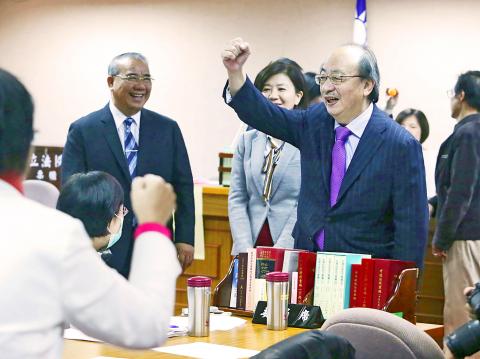The Democratic Progressive Party (DPP) yesterday secured the two convener seats for the legislature’s Judiciary and Organic Laws and Statutes Committee, which is expected to be the main battleground in the new legislative session amid the drives for pension reform and marriage equality.
DPP legislators Tuan Yi-kang (段宜康) and Tsai Yi-yu (蔡易餘) won the seats during the legislature’s committee convener elections.
Tuan, Tsai and Chinese Nationalist Party (KMT) Legislator Lin Wei-chou (林為洲) all received the same number of votes, so a drawing was held to break the tie.

Photo: CNA
Prior to the elections, the People First Party (PFP) gave up two of its seats on the committee to the KMT so that the KMT could compete for a convenor seat.
A committee convener has the right to arrange the review of legislative proposals, and the win by Tuan and Tsai could prove critical for the DPP government’s reform efforts.
The legislature has eight committees and each has two conveners; the DPP secured 11 of the convener seats.
DPP legislators Chiu Yi-ying (邱議瑩) and Gao Jyh-peng (高志鵬) were elected as the conveners of the Economics Committee, while their colleagues Cheng Pao-ching (鄭寶清) and Chen Ou-po (陳歐珀) won the Transportation Committee posts.
The DPP and KMT will share convener duties on five committees.
The DPP’s Pasuya Yao (姚文智) and the KMT’s William Tseng (曾銘宗) are to chair the Internal Administration Committee; Wang Ding-yu (王定宇) of the DPP and Johnny Chiang (江啟臣) of the KMT are to head the Foreign and National Defense Committee; the DPP’s Wang Jung-chang (王榮璋) and the KMT’s Lo Ming-tsai (羅明才) have the Finance Committee seats; the DPP’s Chen Ying (陳瑩) and the KMT’s Lee Yan-hsiu (李彥秀) are to call the shots for the Social Welfare and Environmental Hygiene Committee; and Hsu Chih-chieh (許智傑) of the DPP and Ko Chih-en (柯志恩) of the KMT are to head the Education and Culture Committee.
However, DPP caucus whip Ker Chien-ming (柯建銘) said the election results are not that important.
The party’s solidarity and its ability to communicate key policies are more important in pushing for pension, judicial and tax reforms as well as infrastructure budget proposals.
KMT caucus whip Sufin Siluko (廖國棟) said the KMT and the PFP share the same stance on the pension reform issue, and they would prevent the DPP from forcing through its reform plans.
In related news, the Cabinet and the DPP caucus yesterday thrashed out the bills to be put at the top of legislative agenda, which include amendments to laws governing the benefits of military personnel, public servants, public and private-school teachers and private-sector employees, and transitional justice proposals on political archives, promoting transitional justice, helping the development of Aboriginal languages and an amendment to the Status Act For Indigenous Peoples (原住民身分法).
Others on the list are related to economic development, urban renewal, tax reforms, long-term care and cross-strait relations, Cabinet spokesperson Hsu Kuo-yung (徐國勇) said.
As for the marriage equality proposals, the DPP caucus decided not to list them as urgent bills until there is further consensus among the DPP lawmakers.
Additional reporting by Lee Hsin-fang and CNA

An essay competition jointly organized by a local writing society and a publisher affiliated with the Chinese Communist Party (CCP) might have contravened the Act Governing Relations Between the People of the Taiwan Area and the Mainland Area (臺灣地區與大陸地區人民關係條例), the Mainland Affairs Council (MAC) said on Thursday. “In this case, the partner organization is clearly an agency under the CCP’s Fujian Provincial Committee,” MAC Deputy Minister and spokesperson Liang Wen-chieh (梁文傑) said at a news briefing in Taipei. “It also involves bringing Taiwanese students to China with all-expenses-paid arrangements to attend award ceremonies and camps,” Liang said. Those two “characteristics” are typically sufficient

A magnitude 5.9 earthquake that struck about 33km off the coast of Hualien City was the "main shock" in a series of quakes in the area, with aftershocks expected over the next three days, the Central Weather Administration (CWA) said yesterday. Prior to the magnitude 5.9 quake shaking most of Taiwan at 6:53pm yesterday, six other earthquakes stronger than a magnitude of 4, starting with a magnitude 5.5 quake at 6:09pm, occurred in the area. CWA Seismological Center Director Wu Chien-fu (吳健富) confirmed that the quakes were all part of the same series and that the magnitude 5.5 temblor was

The brilliant blue waters, thick foliage and bucolic atmosphere on this seemingly idyllic archipelago deep in the Pacific Ocean belie the key role it now plays in a titanic geopolitical struggle. Palau is again on the front line as China, and the US and its allies prepare their forces in an intensifying contest for control over the Asia-Pacific region. The democratic nation of just 17,000 people hosts US-controlled airstrips and soon-to-be-completed radar installations that the US military describes as “critical” to monitoring vast swathes of water and airspace. It is also a key piece of the second island chain, a string of

The Central Weather Administration has issued a heat alert for southeastern Taiwan, warning of temperatures as high as 36°C today, while alerting some coastal areas of strong winds later in the day. Kaohsiung’s Neimen District (內門) and Pingtung County’s Neipu Township (內埔) are under an orange heat alert, which warns of temperatures as high as 36°C for three consecutive days, the CWA said, citing southwest winds. The heat would also extend to Tainan’s Nansi (楠西) and Yujing (玉井) districts, as well as Pingtung’s Gaoshu (高樹), Yanpu (鹽埔) and Majia (瑪家) townships, it said, forecasting highs of up to 36°C in those areas